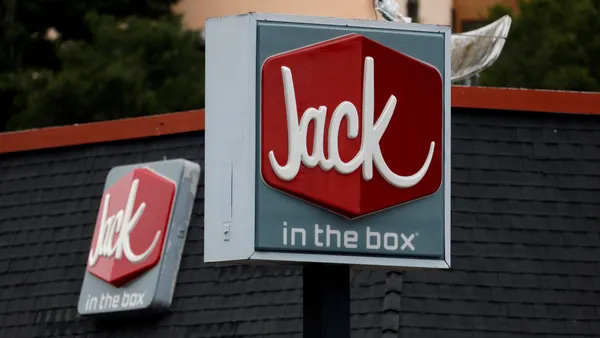Dive Brief:
- Activist investor Jana Partners is pressuring Bloomin' Brands to seek a sale of the entire company or parts of its company which includes Outback Steakhouse, Carrabba's Italian Grill, Bonefish Grill and Fleming's Prime Steakhouse & Wine Bar, according to Restaurant Business.
- The investor owns a 9% stake in the company. This is the second time in about two years the hedge fund has pressured the company to move into a new direction.
- Jana Partners has previously said that shareholder returns would be optimized by splitting up the company into two parts — one around its largest brand, Outback, and the other around its smaller brands.
Dive Insight:
The casual dining segment has been a prime target for activist investors in the past, especially since it has lagged behind other restaurant categories and has failed to quickly adapt to an evolving industry. Red Robin, J. Alexander's and Del Frisco's have all been involved in their own fights with investors. A breakup of Bloomin' could have some implications on the casual dining segment and give other activist investors motivation to pursue grievances among other struggling casual brands.
Jana is no stranger to the restaurant industry either. The company invested in Jack in the Box in the past, encouraging the company to drop its sister chain Qdoba, which it did two years ago.
Notably, Jana is not the only investor calling for a change at the casual dining giant. Last year, Barington Capital Group wrote in a letter to Bloomin' that operating all of these restaurant brands under one company has negatively impacted a "strategic focus and operating execution."
That may be true, and Bloomin's recent results perhaps prove that point. The company ended fiscal 2018 down 2.2% in annual revenue. Its most recent earnings cycle, ending July 31, reported a lackluster 1.3% same-store sales increase for Outback Steakhouse, and an increase of 1.6% at Fleming's, while Carrabba's was down 1.6% and Bonefish was flat. These numbers trailed estimates and eroded some investor confidence.
Having divergent brands under one corporate entity has its pros and cons — lack of strategic focus, as Barington notes, is often cited as a disadvantage, as is excessive overhead and non-streamlined corporate governance. The size of Bloomin's ship provides some fodder for this argument. Barington said that Bloomin' has nearly twice as many corporate employees as rivals Brinker International, Texas Roadhouse and The Cheesecake Factory, which can drag down general and administrative expenses. The investor also argued that Outback has slowed its pace of innovation and no longer has the same level of hospitality as its competitors.
Barington has had some success in pressuring large restaurant groups in spinning off or selling brands. In 2013, when the casual dining segment was reeling from the Great Recession, it made a push for Darden Restaurants to make similar changes, and the company eventually sold Red Lobster. It appears to have paid off, with Darden's shares nearing an all-time high earlier this year.
Conversely, a diversified portfolio can help insulate a company during an economic downturn and can also help the company pool resources and best practices, as other companies like Yum Brands and Inspire Brands have done.
These advantages may be a little harder to come by in the casual and fine dining segments, however, which tend to be affected most by fickle consumers and an even more fickle economy. This time around, Bloomin' has responded that it will consider perspectives shared by Jana. Investors, meanwhile, will likely continue their persistence.










